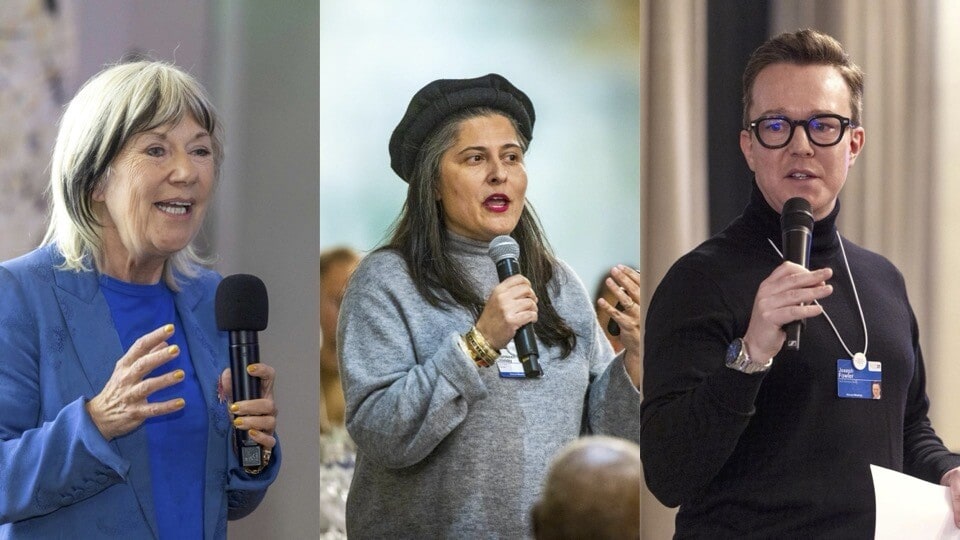Children make adults more compassionate - here's how that could benefit society

Children's involvement in climate change has made a big difference. Image: via REUTERS
- A study set out to discover to what extent adults act differently around children.
- Across eight experiments with over 2,000 participants, and a large field study, they found adults to be more generous and compassionate around children.
- Children are often absent from adult environments, like workplaces and political bodies, where important decisions are made that affect their lives.
- The study's findings suggest that society needs to consider more ways to involve children in various aspects of life.
Most of us assume that we tend to be kinder towards children than we are to adults. Past research confirms this assumption, showing that we’re more caring towards children, and that this effect even extends to being more helpful and empathic towards baby-faced adults.
But no work has been done to examine whether the mere presence of children encourages us to be compassionate and helpful in general – influencing us to be kinder towards other adults, or more giving to charities.
Our recent research set out to understand whether we’re motivated to be more prosocial – defined as behaving in a way that’s intended to benefit others – when we’re either around children, or thinking about them.
Across eight experiments featuring more than 2,000 participants, and a large field study, we found adults to be more generous and compassionate when children were present – suggesting initiatives such as the “Children’s Parliament”, which aim to introduce children into what are traditionally adult spaces, could have a profound influence on adult decision-making across society.

Emotions and children
We know that children elicit strong emotions in us, especially when they come to harm. For example, few images have sparked such an international outcry of sympathy as the photo of a dead boy, Aylan Kurdi, whose body washed up on a Turkish beach during the 2015 Syrian migration crisis.
In fact, research has found that sympathy with Kurdi’s fate generated concern and solidarity with refugees more widely, as evidenced by greater social media engagement, a 100-fold increase in the number of donations made to aid Syrian refugees, and announcements of new governmental policies to resettle more than 150,000 refugees.
In some ways, the power of this single image is not surprising. Organisations that lobby for the poor and vulnerable have long suspected that they can enhance interest and support by putting children front and centre of their campaigns. For instance, children have been featured in campaigns for charity donations, environmental protection and healthy living. These campaigns reveal a widespread assumption that children elicit sympathetic reactions in adults.
Increasing sympathy
In our experiments, we wanted to find out whether the emotional effect inspired by children extends beyond our feelings for the young and into the wider world. To encourage adult participants to think about children, we asked them to describe what typical children are like (for example, their appearance and typical behaviour). Participants in control conditions described typical adults or skipped this task.
Those participants we asked to describe children later reported higher prosocial motivation. That is, they reported a greater willingness to attain broad prosocial goals such as helping others, social justice, and protecting the environment. Participants also reported greater empathy with the plight of other adults after they had thought about children.
In a subsequent field study that built on these findings, we found that adults on a shopping street were more likely to donate to a charity supporting research on bone marrow disease when more children were nearby relative to adults.
When no children were present and all passers-by were adults, we observed roughly one donation every ten minutes. But when children and adults were equally present on the shopping street, that figure doubled to two donations every ten minutes.
These effects could not be accounted for by higher footfall during busy times or whether donors were accompanied by a child or not. Instead, they suggest that the presence of children can nudge adults to donate more often, even when the charity is not specifically linked to children.
Across our studies, thinking about children or being in the presence of children elicited greater compassion with others in a range of people: parents and non-parents, men and women, younger and older participants – even among those who had relatively negative attitudes towards children. So the findings point to a pervasive effect with deep and wide-ranging implications for society.
Adult-only environments
Our research provides a glimpse of a much bigger picture. Children are often separated from adult environments, such as workplaces and political bodies, where important decisions are made that affect children’s lives – for instance, around climate change.
Our findings suggest that society needs to consider more ways to involve children in various aspects of life. For example, explicitly considering impacts on children in political and legislative bodies may promote decisions that appropriately take the needs and rights of children and future generations into account.
Some initiatives over recent years have placed increased emphasis on young voices, including the “Children’s Parliament” in the UK and the global school climate strikes in 2019, in which 1.4 million children took part. Our research suggests that such initiatives do not only provide an obvious and important benefit for children – they also elicit a prosocial orientation in wider society that could benefit everyone.
Don't miss any update on this topic
Create a free account and access your personalized content collection with our latest publications and analyses.
License and Republishing
World Economic Forum articles may be republished in accordance with the Creative Commons Attribution-NonCommercial-NoDerivatives 4.0 International Public License, and in accordance with our Terms of Use.
The views expressed in this article are those of the author alone and not the World Economic Forum.
Stay up to date:
Retail, Consumer Goods and Lifestyle
Related topics:
Forum Stories newsletter
Bringing you weekly curated insights and analysis on the global issues that matter.
More on Arts and CultureSee all
Elena Raevskikh and Giovanna Di Mauro
October 22, 2025






